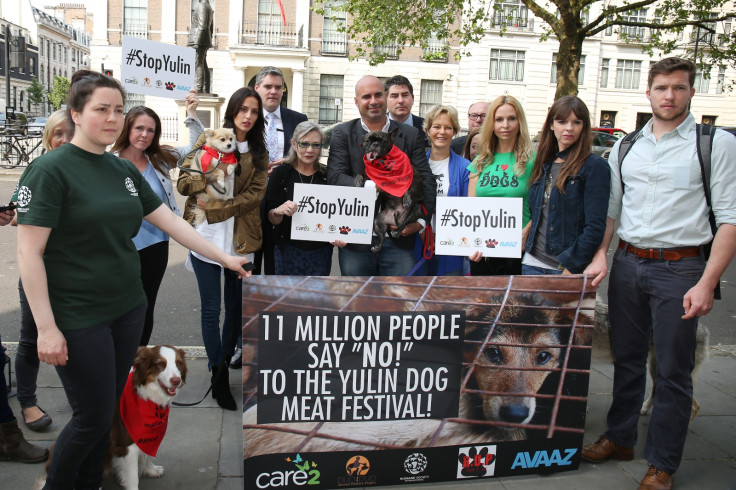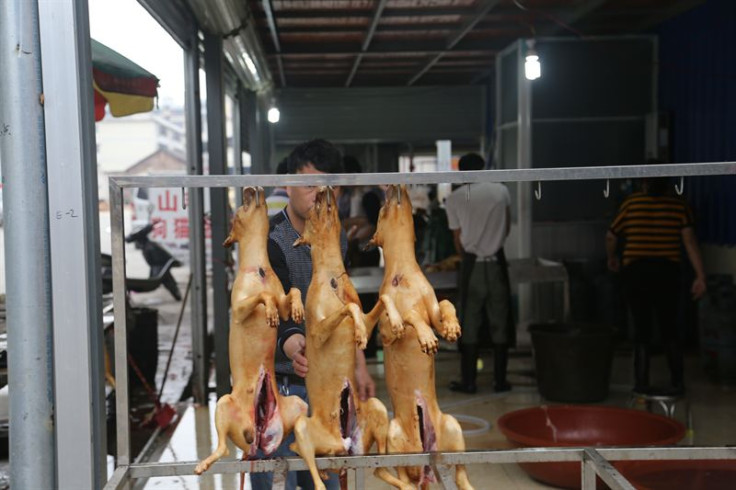Yulin dog meat festival: Don't judge China unless you criticise meat eating in the West
If you want to get squeamish about this – first take a cold, hard look at meat producing in your own country.
Every year, pictures from Yulin dog meat festival circulate online, with horrified reactions on social media calling for the barbaric practice to end. Earlier this month, celebrities, MPs and campaigners supported a petition to stop the festival at the Chinese Embassy in London.
As this year's festival begins in the Chinese city, it's worth pointing out that the responses from many condemning the practice are extremely hypocritical. Though the pictures appal me too, it is quite ridiculous how much attention this shameful festival gets from Western media. Unless the UK becomes a completely vegetarian country and stops rearing animals for their flesh, most people don't have a leg to stand on when it comes to complaining about a meat-eating festival.
It is not as if all 1.4 billion Chinese people go around eating dog meat during this festival, as many would have you believe. Labelling it as China's annual dog meat festival is incorrect, and means that the whole of the country's population comes under scrutiny. So to clear things up: the majority of Chinese people do not eat dog, and there is an ever-growing movement against the festival.
If the Western world does want to get oh-so-squeamish about the antics of a small Chinese city (less than 7 million – a mere blip on the Chinese map), where only a subsection of residents partake – the local government has distanced itself from the gathering and officials are reportedly banned from attending – then they first need to take a cold, hard look at the meat producing processes within their own countries. Anything less would be insincere.
The Yulin Dog Meat Festival began in 2009 and is now the only festival of its type, after the discontinuation of the Zhejiang Jinhua dog meat festival in 2011, which had supposedly run for over 600 years. Many campaign groups, including Humane Society International, have been working towards ending the only dog meat festival altogether in China, where they claim that thousands of dogs, many of them stolen pets, are consumed.
International outrage at this festival reached fever pitch in 2014, when activists and international media shone a light on this otherwise non-descript lower tier Chinese city. Unfortunately, however, as a result of the global pressure, some locals claimed they would double down on dog intake, so insulted were they by international indignation.

Campaigns admonishing Chinese people for a practice many believe is part of their tradition only polarises the two sides of the argument and in this case, led to an inflated sense of national pride. If there is one thing to learn from China's recent history, it is that they will not be cowed by international pressure. This movement needs to come from within.
A backlash against the festival has begun in the Middle Kingdom, with many Chinese campaigners and activists travelling to Yulin to try and save the canines and raise awareness for the cause, sometimes at risk to their personal safety. This month, it was revealed that there might be some sort of consensus forming on the issue within the country, when Chinese national broadcaster, CCTV, released the results of a survey that showed 65% of people agree eating dog should be banned.
China is a country of extremes, with rural impoverished towns juxtaposed against some of the world's most cosmopolitan cities, and naturally, views differ. Shanghai local media last year pointed out that "well-off" citizens were beginning to fight what they see as barbarous abuses of man's best friend and poured scorn on the festival.
Up-and-coming Chinese cities, with a new generation of educated, informed middle-class citizens, are also increasingly aware of the concept of animal rights. Proof of this awareness, and subsequent action, was displayed this when Chinese animal rights campaigners handed a petition, with 11 million signatures, calling for an end to the Yulin festival.

It is this type of internal complaint, rather than international protests, which will eventually affect change in China. Anything else just serves to inflame nationalist sentiment.
Engaging in dialogue, rather than reproaching dog eaters from on a high horse, is the most logical way forward. Instead of creating an expensive media campaign, as the Humane Society International did this year, with the addition of a whole host of British celebrities and their pet pooches, it would be better to funnel money into empowering people on the ground in China. This would help to educate and inform the minority of dog meat eaters in Yulin about the threat to public health and safety, through the potential spread of rabies, as well as the problem of stolen pets.
Ultimately, on the issue of ethics, Yulin festival goers will have to find their own justifications for consuming dogs, but until the meat industry in the West completely eliminates animal suffering across the board, only vegans, vegetarians and perhaps subsistence farmers, can legitimately air their concerns.
Nyima Pratten is Managing Editor of expat lifestyle magazine, Talk Shanghai.
© Copyright IBTimes 2025. All rights reserved.




















